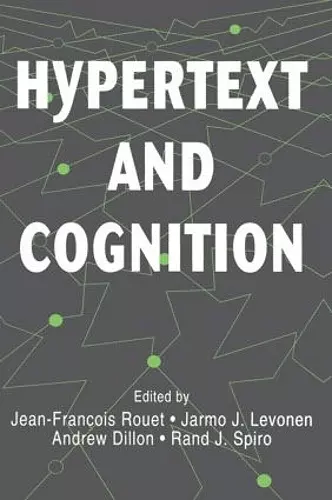Hypertext and Cognition
Andrew Dillon editor Rand J Spiro editor Jean-Francois Rouet editor Jarmo J Levonen editor
Format:Paperback
Publisher:Taylor & Francis Inc
Published:1st Apr '96
Currently unavailable, our supplier has not provided us a restock date
This paperback is available in another edition too:
- Hardback£140.00(9780805821437)

The recent evolution of western societies has been characterized by an increasing emphasis on information and communication. As the amount of available information increases, however, the user -- worker, student, citizen -- faces a new problem: selecting and accessing relevant information. More than ever it is crucial to find efficient ways for users to interact with information systems in a way that prevents them from being overwhelmed or simply missing their targets. As a result, hypertext systems have been developed as a means of facilitating the interactions between readers and text. In hypertext, information is organized as a network in which nodes are text chunks (e.g., lists of items, paragraphs, pages) and links are relationships between the nodes (e.g., semantic associations, expansions, definitions, examples -- virtually any kind of relation that can be imagined between two text passages). Unfortunately, the many ways in which these hypertext interfaces can be designed has caused a complexity that extends far beyond the processing abilities of regular users. Therefore, it has become widely recognized that a more rational approach based on a thorough analysis of information users' needs, capacities, capabilities, and skills is needed. This volume seeks to meet that need.
From a user-centered perspective -- between systems and users -- this volume presents theoretical and empirical research on the cognitive processes involved in using hypertext. In so doing, it illustrates three main approaches to the design of hypertext systems:
*cognitive, which examines how users process multilayered hypertext structures;
*ergonomical, which explores how users interact with the design characteristics of hardware and software; and
*educational, which studies the learning objectives, frequency and duration of hypertext sessions, type of reading activity, and the user's learning characteristics.
This volume also tries to provide answers for the questions that have plagued hypertext research:
*What is hypertext good for?
*Who is hypertext good for?
*If it is useful for learning and instruction, then what type?
*What particular cognitive skills are needed to interact successfully with a hypertext system? Anyone interested in the fields of computer science, linguistics, psychology, education, and graphic design will find this volume intriguing, informative, and a definitive starting point for future research in the field of hypertext.
"This volume represents a highly innovative attempt to lay the conceptual foundations for a rational approach to the design and evaluation of hypertext based on empirical and theoretical research concerned with the abilities, needs, and goals of potential users."
—Contemporary Psychology
"Rouet, Levonen, Dillon and Spiro have edited a very interesting volume addressing issues concerning hypertext and cognition. The book is small but comprehensive.
—British Journal of Educational Psychology."
"From this more general perspective, the positons stated in the book will hopefully survive several generations of technological innovations."
—British Journal of Educational Psychology
"Rouet, Levonen, Dillon and Spiro have edited a very interesting volume addressing issues concerning hypertext and cognition. Dillon's chapter on the myths and misconceptions of the implications of hypertext systems is enlightening and very well presented. Individually, the chapters provide eclectic snapshots of hypertextual effects, but taken together in this volume they begin to tell a consistent story..."
—British Journal of Educational Psychology
"Hypertext and Cognition consists in a series of articles that share an empirical, level-headed approach to hypertext and its potential uses. As such the volume makes an interesting and useful addition to the rapidly growing literature on this intriguing information technology."
—Pragmatics & Cognition
ISBN: 9780805821444
Dimensions: unknown
Weight: 360g
192 pages